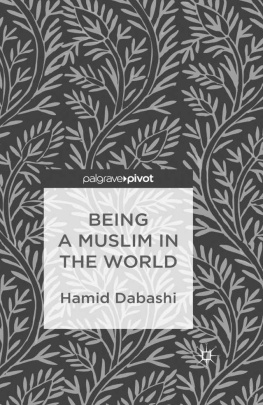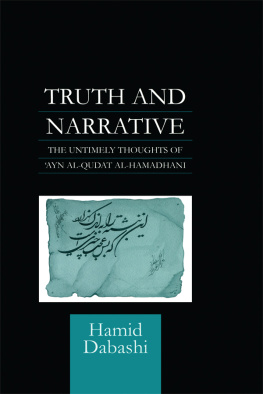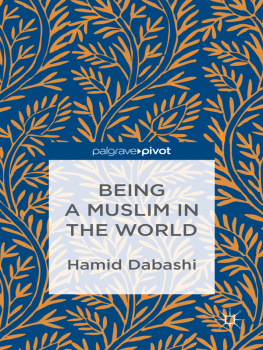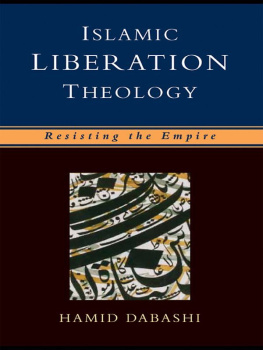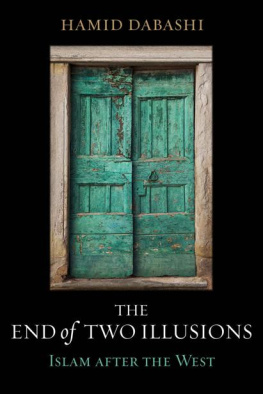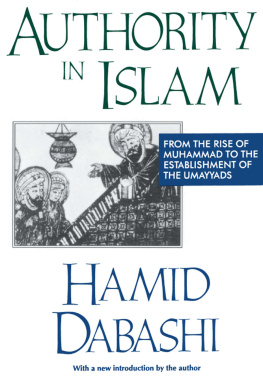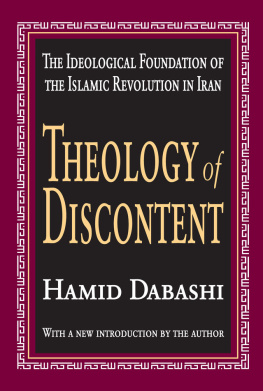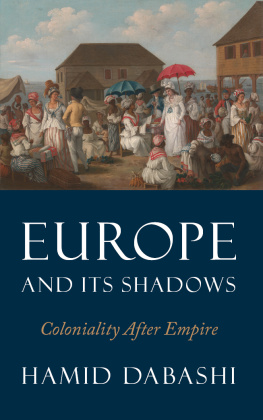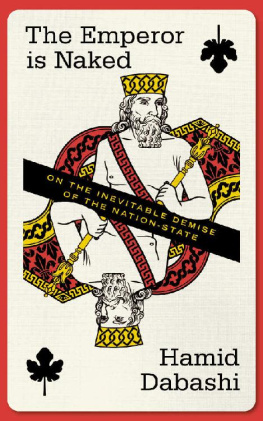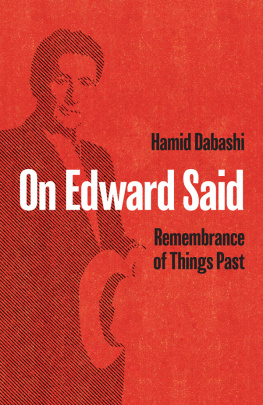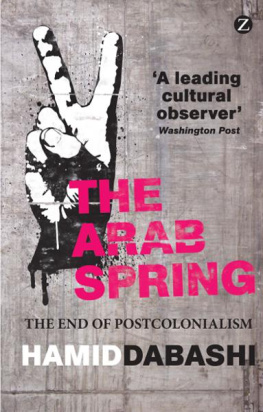Hamid Dabashi (auth.) - Being a Muslim in the World
Here you can read online Hamid Dabashi (auth.) - Being a Muslim in the World full text of the book (entire story) in english for free. Download pdf and epub, get meaning, cover and reviews about this ebook. year: 2013, publisher: Palgrave Macmillan US, genre: Politics. Description of the work, (preface) as well as reviews are available. Best literature library LitArk.com created for fans of good reading and offers a wide selection of genres:
Romance novel
Science fiction
Adventure
Detective
Science
History
Home and family
Prose
Art
Politics
Computer
Non-fiction
Religion
Business
Children
Humor
Choose a favorite category and find really read worthwhile books. Enjoy immersion in the world of imagination, feel the emotions of the characters or learn something new for yourself, make an fascinating discovery.
- Book:Being a Muslim in the World
- Author:
- Publisher:Palgrave Macmillan US
- Genre:
- Year:2013
- Rating:3 / 5
- Favourites:Add to favourites
- Your mark:
- 60
- 1
- 2
- 3
- 4
- 5
Being a Muslim in the World: summary, description and annotation
We offer to read an annotation, description, summary or preface (depends on what the author of the book "Being a Muslim in the World" wrote himself). If you haven't found the necessary information about the book — write in the comments, we will try to find it.
Being a Muslim in the World — read online for free the complete book (whole text) full work
Below is the text of the book, divided by pages. System saving the place of the last page read, allows you to conveniently read the book "Being a Muslim in the World" online for free, without having to search again every time where you left off. Put a bookmark, and you can go to the page where you finished reading at any time.
Font size:
Interval:
Bookmark:
BEING A MUSLIM IN THE WORLD
Copyright Hamid Dabashi, 2013.
Softcover reprint of the hardcover 1st edition 2013 All rights reserved.
First published in 2013 by PALGRAVE MACMILLAN
in the United Statesa division of St. Martins Press LLC, 175 Fifth Avenue, New York, NY 10010.
Where this book is distributed in the UK, Europe and the rest of the world, this is by Palgrave Macmillan, a division of Macmillan Publishers Limited, registered in England, company number 785998, of Houndmills, Basingstoke, Hampshire RG21 6XS.
Palgrave Macmillan is the global academic imprint of the above companies and has companies and representatives throughout the world.
Palgrave and Macmillan are registered trademarks in the United States, the United Kingdom, Europe and other countries.
ISBN: 978-1-349-45347-4 ISBN: 978-1-137-30129-1
Library of Congress Cataloging-in-Publication Data is available from the Library of Congress.
A catalogue record of the book is available from the British Library.
First edition: 2013 www.palgrave.com/pivot
DOI 10.1057/9781137301291
For the memories
of my mothers silent prayers and my fathers loud protests
In the name of God, the Beneficent, the Merciful
Hast thou observed him who belieth religion?
That is he who repelleth the orphan And urgeth not the feeding of the needy.
Ah, woe unto worshippers Who are heedless of their prayer;
Who would be seen (at worship)
Yet refuse small kindnesses!
The Holy Quran, chapter 107, Al-Maun/Acts of Kindness
palgrave^pivot
www.pslgrave.com/pivot
Civilization: The West and the Rest who would write a book with a title like that today, and what could it possibly mean? The British historian Niall Ferguson has made a reputation for himself for theorizing the West as the defining disposition of humanity at large. But like many other latter-day ideologues of the beleaguered empire, Niall Ferguson is more a panegyrist of the West than its prognosticator.
If the idea that science, medicine, or work ethic were the virtues and achievements that civilizations around the globe lacked before the West appeared on the horizon was offered in a sophomoric essay in any half decent college, the idiocy would earn a much-deserved F for the student. But why is it that when offered by an historian it receives a bravura publication? The answer has to be in the realm of the mass hysteria that these sorts of ideas generate at the world-historic moment when this very West, as an idea, is witnessing its own demise. That we are living through the end of Western ascendancy, so far as Ferguson thinks he is the harbinger of that good tiding, is a splendid thingfor that ascendency was predicated on mass murder and mayhem from one end of the earth to the other (including the European Holocaust), and on the global plundering of planetary resources. The word civilization in Fergusons title is the giveawaythe unabashedly racialized self-congratulation that before this West there was no civility, and that after the Wests
demise it will die. As a categorical imperative, the West is dying, and that is a good thingfor that means the world is delivered from one of the ghastliest imperial projects ever historically coined and experienced. As for science, medicine, literature, philosophy, and suchwhat the West picked up from previous empires and expanded upon will survive its demise and be carried over into the new global formations of the world. Upon that world, peopleincluding Muslimswill now have to imagine themselves in a post-Western history that is finally delivered from one particularly troublesome delusion.
The West is no moreand nor are, a fortiori, all the binaries it has coined and crafted over the last two hundred years pluschief among them the notion of Islam that Orientalism invented for the West. The West and the Rest was the language of the European and American imperialism at the height of the normative hegemony that crafted the West and subjugated the Rest. Niall Ferguson and his ilk come at the tail end of that narrative fiction. Financially bankrupt (look at Greece, the fictive birthplace of the West); politically corrupt (look at presidential elections in the US); economically stagnant (look at the US debt to China); and diplomatically inept (look at the Iranian nuclear issue), all signs indicate that this thing Niall Ferguson still calls the West has long since implodedwith post-modernism and post-structuralism as its paramount philosophical eulogies.
What does it mean to be a Muslim in this post-Western world? What world will Muslims inhabit in post-Western societies, in or out of the Muslim world as we have hitherto understood, defined, and located it? In what way can even we talk about a Muslim world, and how is that world different, integral, or embedded in other worlds? Doesnt the end of the West as a self-asserted criterion also mean the end of Muslim world as it was manufactured in liaison with that divisive category?
To have a world means to have an attitude toward it, as Gadamer noted in Truth and Method (i960), and that attitude is linguistically mitigated. As a historian of endangered species, Niall Fergusson is a museum piece, a dying specimen of what he desperately celebrates, the chronicler of a world that no longer commands our attention. I write this book in the exact opposition of his direction. He writes to extol the centrality of that Western figment of his imaginationI write in the aftermath of the calamity that this term and, what it stood for, visited upon the world. He mourns the decline of that WestI celebrate it. He mourns the decline of an imperial adventure that made his race feel triumphant; I sing the praise of the people I call my ownfrom Asia to Africa to Latin Americawho survived its terror with tenacity, creativity, and courage. The imperial conquest of the world that kept calling itself the West, not dissimilarly to other globalized empiresfrom the Achamanids to the Abbasids to the Mongolshas fortunately come to an end, and the globalized condition of the capital that has befallen the planet no longer has any one particular empire in control. The Americans, Europeans, Russians, or the Chinese may think they are in controlbut they neutralize each other, and a mass democratic uprising, open-ended precisely because its outcome is uncertain, has forced history into a new point of origin. The West no longer has either a military, moral, or normative command over anyones credulity. Nostalgia for a defeated world must perforce yield to embracing and celebrating the one that is surfacing. Being a Muslim in the world means to come to terms with the emerging post-Western world that is rising beyond the power and hegemony of the last empire.
The Islam that the West needed and gave birth to a set of twins that match each other perfectly: we must decouple those twins as we recognize the coupling of Osama bin Laden and Ayaan Hirsi Ali as the binary opposites of militant Islamism and rabid Islamophobia that both require each other and cancel each other out. As we leave this couple in the company of Niall Fergusson, and bid them all well to sort out their differences, a vast and more widely open world is open to us in which to wonder and figure out how is it possible to be a Muslim in the world.
The first task Muslims face is actively to imagine ourselves in a world liberated from the the West and all the false binaries it has generated and sustained. In chapter 1, But There Is Neither East nor West, I posit the question of what it means to be a Muslim in the world in the context of the collapsing of the Islam and the West binary. The transition requires the crafting of a new language for coming to terms with Islam, and it no longer matters if it is in Arabic, Persian, German, or English, as long as that language is in conversation with the emerging, not the disappearing, world. What matters is the paramount hermeneutic necessity that the particularity of that language is stipulated within its presumed or intended universality. That universality is changing, and the sooner we begin to reconfigure the language that Muslims speak in relation to that emerging universality, the better. The time is in fact urgent and fast upon us. The language of Islam and the West, as the language of religion versus secularism has exhausted itself, slammed into a cul de sac, and with the decline and implosion of the West, the emerging diction of Muslims must flower into its own universality, a universality embedded in the global context of our worldliness.
Next pageFont size:
Interval:
Bookmark:
Similar books «Being a Muslim in the World»
Look at similar books to Being a Muslim in the World. We have selected literature similar in name and meaning in the hope of providing readers with more options to find new, interesting, not yet read works.
Discussion, reviews of the book Being a Muslim in the World and just readers' own opinions. Leave your comments, write what you think about the work, its meaning or the main characters. Specify what exactly you liked and what you didn't like, and why you think so.

